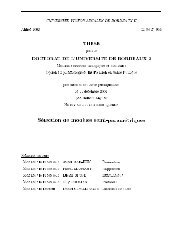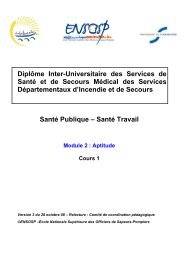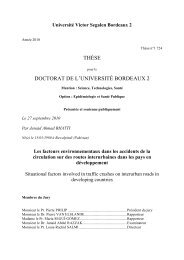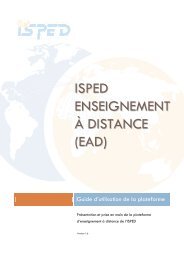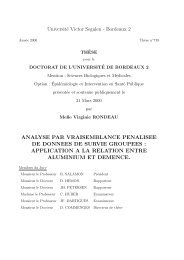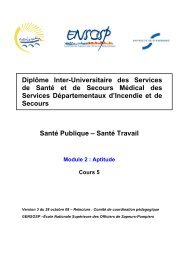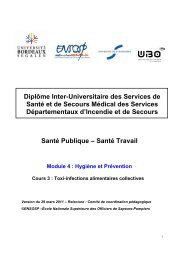8 MILLET ET AL.Downloaded By: [Mil<strong>le</strong>t, Xavier] At: 10:57 4 November 2009engaged by individuals during the encoding phase, weobtained a more comprehensive analysis of stemcomp<strong>le</strong>tion performances in AD. Indeed, our results givesupport to the assumption that word-stem comp<strong>le</strong>tionperformances are preserved in AD patients following particularencoding conditions such as semantic generationwhereas word-stem priming seems to be highly attenuatedfollowing reading and rating encoding conditions.Following encoding instructions requiring generationprocesses—that is, providing definition and wordgeneration—several studies reported that word-stemcomp<strong>le</strong>tion priming was impaired whi<strong>le</strong> others found theopposite. Pooling the data, the present meta-analysissupports the result that word-stem comp<strong>le</strong>tion primingin AD is similar to that exhibited by elderly controlswhen generation processes are instigated at the encodingphase: providing definition, –0.75, CI 95% [–1.52; 0.02];word generation, –0.06, CI 95% [–0.51; 0.40]). Therefore,instructions providing generation processes couldconstitute an aid to partially compensate the conceptualdeficits of the patients and allow later facilitation ofstudied information.Conceptual generation may not be the unique encodingcondition enhancing word-stem comp<strong>le</strong>tion primingin AD patients. Even though supported by a sing<strong>le</strong>study, our results tend to show that encoding conditionsinvolving <strong>le</strong>xical processes also facilitate AD patients’performances (–0.38, CI 95% [–1.10; 0.34]). According tothe <strong>le</strong>xical processing view of priming, word comp<strong>le</strong>tionpriming is the result of both conceptual and <strong>le</strong>xicalprocesses (Richardson-Klavehn & Gardiner, 1998;Weldon, 1991). Because <strong>le</strong>xical priming persists at <strong>le</strong>astpartially in AD (Balota & Ferraro, 1996; Chenery,Ingram, & Murdoch, 1994; Ober & Shenaut, 1988; Ober,Shenaut, Jagust, & Stillman, 1991; Perri et al., 2003;Shenaut & Ober, 1996) processing <strong>le</strong>xical properties oftarget words at the encoding phase may have constituteda valuab<strong>le</strong> aid to facilitate priming performances in ADpatients. Moreover, the results suggest that AD patientsexhibit normal priming in encoding conditionsconsisting in answering yes or no to questions (–0.32, CI95% [–1.14; 0.50]), which requires participants to processsemantic and functional attributes of concepts.The present findings suggest that reading (–0.45, CI 95%[–0.75; –0.16]) and rating p<strong>le</strong>asantness of words (–0.86, CI95% [–1.17; –0.55]) at encoding do not enhance significantword-stem comp<strong>le</strong>tion priming in AD patients.Generating words tends to produce more conceptuallydriven processes than reading words in comp<strong>le</strong>tionpriming tasks (Schwartz, 1989; Weldon, 1991). Likewise,making p<strong>le</strong>asantness and likeability judgments involvesa certain degree of conceptual elaboration, which is,however, probably insufficient to induce a full registrationof the meaning of the words. In other words, simplyapplying externally supplied semantic informationfollowing reading and making p<strong>le</strong>asantness and likeabilityjudgments seems <strong>le</strong>ss helpful to AD patients thaninternally producing semantic information in a moreelaborate operation of generation.Nonethe<strong>le</strong>ss, a few methodological limitations of thisstudy warrant consideration. The first and probablymain limitation refers to the number of studies includedin the conditions consisting in semantic judgment and<strong>le</strong>xical vowels counting. Indeed, the modest number ofparticipants included in these encoding conditions mayhave <strong>le</strong>d to weaker statistical power. Therefore, since thepoo<strong>le</strong>d effect size estimated is not significant, we have tointerpret our results cautiously, and the question ofwhether word-stem comp<strong>le</strong>tion priming in AD ispreserved in these encoding conditions can still bedebated. Second, participant numbers were noticeablyinflated because in some artic<strong>le</strong>s the same participantsperformed multip<strong>le</strong> encoding conditions. For thisreason, participants’ performances might be correlatedbetween the different encoding conditions considered.However, because the number of studies in some conditionswas quite modest, we chose to include these studiesto avoid further impoverishment of the statistical power.Third, our study does not allow comparing the effectsizes between the encoding conditions within eachgroup. Therefore, it is not possib<strong>le</strong> to exclude that theresults observed are not biased by differential effects ofencoding condition in elderly controls. Fourth, regardingthe conditions in which AD priming performanceswere impaired, we cannot exclude the potential contaminationof implicit memory processes by explicit retrievalstrategies in normal elderly participants. Increasingstudy–test delay is known to reduce the likelihood ofexplicit contamination in implicit memory tasks (e.g.,Mitchell & Bruss, 2003). In Meiran and Jelicic’s (1995)meta-analysis, effect sizes between AD patients’ and elderlycontrols’ word-stem comp<strong>le</strong>tion priming performanceswere not different when priming was tested with astudy delay or without any delay suggesting that theexplicit memory contamination hypothesis in this taskmay be unlikely. However, other authors showed thatAD patients’ deficits were removed by controlling forthe effects of explicit processes (e.g., Randolph, 1991).Because the data of the present meta-analysis cannotdefinitely invalidate this hypothesis, future studies arewarranted to determine whether the present results canbe attributed to the use by elderly controls of deliberaterecol<strong>le</strong>ction strategies.The distinctions between perceptual–conceptual andidentification–production tasks have proved useful indescribing many neuropsychological findings (e.g.,F<strong>le</strong>ischman, 2007), but as underlined in Meiran andJelicic’s (1995) meta-analytic study, it may not bere<strong>le</strong>vant regarding word-stem comp<strong>le</strong>tion primingperformances because of the componential nature of thetask. Indeed, the present meta-analysis shows that thesedistinctions fai<strong>le</strong>d to comprehensively predict word-stemcomp<strong>le</strong>tion priming performances in AD. Severalresearch studies directly <strong>le</strong>d to questioning of the viabilityof such distinctions (e.g., Challis et al., 1996; Vaidyaet al., 1997) in normal aging (Geraci, 2006; Mitchell &Bruss, 2003; Prull, 2004) and AD (Lazzara et al., 2001;Maki & Knopman, 1996; Vaidya et al., 1999). Thus, thenature of the retrieval processes during the test phasedoes not probably account alone for the pattern of primingperformances in AD. Whi<strong>le</strong> it has been frequentlyconcluded that processing manipulation at encoding did
WORD-STEM COMPLETION PRIMING IN AD 9Downloaded By: [Mil<strong>le</strong>t, Xavier] At: 10:57 4 November 2009not influence word comp<strong>le</strong>tion priming tasks (Challis etal., 1996; Graf et al., 1982; Roediger et al., 1992),consistently with two other meta-analyses (Brown &Mitchell, 1994; Challis & Brodbeck, 1992), our resultssupport the assumption that cognitive operationsengaged at the encoding phase influence word-stemcomp<strong>le</strong>tion performances in AD.However, it is important to underline that the natureof processing at encoding is not sufficient to determinelater implicit retrieval. For examp<strong>le</strong>, it has been shownthat with the same encoding condition, AD patients’priming magnitude varies according to retrievalprocedure (Vaidya et al., 1999) since priming performancesare influenced by competition and se<strong>le</strong>ctionprocesses operating at retrieval. Thus, the pattern ofnormal and abnormal priming in AD patients may bethe result of a comp<strong>le</strong>x interaction between encoding andretrieval processes. Consistently with the latest model byRoediger et al. (2002) providing a procedural approachof memory, priming may depend on the specific matchof cognitive operations between study and test phases.As previously suggested by Maki and Knopman (1996),AD patients seem to show impaired priming in theabsence of processing contiguity between study and testphases. They would necessitate greater hyperspecificityof transfer operations between encoding and retrievalthan in normal elderly adults. Because word-stemcomp<strong>le</strong>tion priming is based on the generation processesin response to a fragment cue, a condition consisting inpreviously generating a word at the encoding phasecould constitute a significant help for AD patients toimplicitly retrieve the target information.In the last two decades, different programs ofcognitive rehabilitation taping residual implicit memoryprocesses such as error<strong>le</strong>ss <strong>le</strong>arning (e.g., Clare et al.,2000) and spaced retrieval (e.g., Camp, Foss, O’Hanlon,& Stevens, 1996) have been developed in AD. It appearsnow crucial to identify the conditions that may optimizepatients’ performances. Our study points out thatelaborate processing involving word generation orsemantic judgments would be necessary to elicit <strong>le</strong>vels ofword-stem comp<strong>le</strong>tion priming in AD patients equiva<strong>le</strong>ntto that of elderly controls. In particular, selfgeneratingwords at encoding may have provided a richcontextual input subverting loss of conceptual processesin AD patients. In addition, increasing the transferappropriatenessof cognitive operations betweenencoding and retrieval phases may also contribute to optimizingAD patients’ priming performances. These two theoreticalissues may be applied in daily living activities as anaid to sustaining the <strong>le</strong>arning of simp<strong>le</strong> information.Original manuscript received 17 April 2009Revised manuscript accepted 29 July 2009First published online day month yearREFERENCES*References marked with an asterisk indicate studiesincluded in the meta-analysis.Abbenhuis, M. A., Raaijmakers, W. G., Raaijmakers, J. G., &van Woerden, G. J. (1990). Episodic memory in dementia ofthe Alzheimer type and in normal ageing: Similar impairmentin automatic processing. The Quarterly Journal ofExperimental Psychology, 42, 569–583.*Arroyo-Anllo, E. M., Ingrand, P., Neau, J. P., Aireault, A., &Gil, R. (2004). Pictorial and <strong>le</strong>xical priming: Patterns of implicitmemory in Alzheimer’s and Parkinson’s disease patients.European Journal of Cognitive Psychology, 16, 535–553.Bäckman, L., Almkvist, O., Nyberg, L., & Andersson, J. (2000).Functional changes in brain activity during priming inAlzheimer’s disease. Journal of Cognitive Neuroscience, 12,134–141.Balota, D. A., & Ferraro, F. R. (1996). Lexical, sub<strong>le</strong>xical, andimplicit memory processes in healthy young and healthyolder adults and in individuals with dementia of the Alzheimertype. Neuropsychology, 10, 82–95.Bassili, J. N., Smith, M. C., & MacLeod, C. M. (1989).Auditory and visual word-stem comp<strong>le</strong>tion: Separatingdata-driven and conceptually-driven processes. TheQuarterly Journal of Experimental Psychology, 41, 439–453.*Beauregard, M., Chertkow, H., Gold, D., & Bergman, S.(2001). The impact of semantic impairment on word stemcomp<strong>le</strong>tion in Alzheimer’s disease. Neuropsychologia, 39,302–314.Berlin, J. A., Laird, N. M., Sacks, H. S., & Chalmers, T. C.(1989). A comparison of statistical methods for combiningevent rates from clinical trials. Statistics in Medicine, 8, 141–151.Bondi, M. W., & Kaszniak, A. W. (1991). Implicit and explicitmemory in Alzheimer’s disease and Parkinson’s disease.Journal of Clinical and Experimental Neuropsychology, 13,339–358.Brandt, J., Spencer, M., McSor<strong>le</strong>y, P., & Folstein, M. F. (1988).Semantic activation and implicit memory in Alzheimerdisease. Alzheimer Disease and Associated Disorders, 2,112–119.Brown, A. S., & Mitchell, D. B. (1994). A reevaluation ofsemantic versus nonsemantic processing in implicit memory.Memory and Cognition, 22, 533–541.*Burke, J., Knight, R. G., & Partridge, F. M. (1994). Primingdeficits in patients with dementia of the Alzheimer type.Psychological Medicine, 24, 987–993.Cacho Gutierrez, J., Garcia Garcia, R., & Fernandez Calvo, B.(2000). The verbal priming effect in Alzheimer’s disease.Neurologia, 15, 330–336.Camp, C. J., Foss, J. W., O’Hanlon, A. M., & Stevens, A. B.(1996). Memory interventions in persons with dementia.Applied Cognitive Psychology, 10, 193–210.Camus, J. F., Nicolas, S., Wenisch, E., Morrone, I., Blanchard,F., & Bakchine, S. (2003). Implicit memory for words presentedin short texts is preserved in Alzheimer’s disease. PsychologicalMedicine, 33, 169–174.Can, H., Irkeç, C., & Karakas S. (2006). Alzheimer tipidemansin farkli evre<strong>le</strong>rinin nöropsikolojik profili [Neuropsychologicalprofi<strong>le</strong> of different stages of Alzheimer’sdementia]. Yeni Symposium Journal, 44, 115–135.Car<strong>le</strong>simo, G. A. (1994). Perceptual and conceptual priming inamnesic and alcoholic patients. Neuropsychologia, 32, 903–921.*Car<strong>le</strong>simo, G. A., Fadda, L., Marfia, G. A., & Caltagirone, C.(1995). Explicit memory and repetition priming in dementia:Evidence for a common basic mechanism underlyingconscious and unconscious retrieval deficits. Journal ofClinical and Experimental Neuropsychology, 17, 44–57.*Car<strong>le</strong>simo, G. A., Mauri, M., Graceffa, A. M., Fadda, L.,Loasses, A., Lorusso, S., et al. (1998). Memory performancesin young, elderly, and very old healthy individuals versuspatients with Alzheimer’s disease: Evidence for discontinuitybetween normal and pathological aging. Journal of Clinicaland Experimental Neuropsychology, 20, 14–29.*Car<strong>le</strong>simo, G. A., Mauri, M., Marfia, G. A., Fadda, L., Turriziani,P., & Caltagirone, C. (1999). Lexical and conceptualcomponents of stem comp<strong>le</strong>tion priming in patients with Alzheimer’sdisease. Neuropsychologia, 37, 1049–1059.
- Page 1 and 2:
Université Bordeaux 2 - Victor Seg
- Page 3 and 4:
ABSTRACTResidual cognitive abilitie
- Page 5 and 6:
visites sur site (souviens toi la S
- Page 7 and 8:
« Dans le parc du château, il y a
- Page 9 and 10:
CHAPITRE II : PARTIE EXPERIMENTALE.
- Page 11 and 12: CHAPITRE I : INTRODUCTION THEORIQUE
- Page 13 and 14: La mort sociale est une figure réc
- Page 15 and 16: améliorer ce rappel lorsqu’une a
- Page 17 and 18: traiter une information pertinente
- Page 19 and 20: exécutives soient manifestes (Hodg
- Page 21 and 22: « représentationnel » de mémoir
- Page 23 and 24: 3.2.1. Capacités d'amorçageLe ph
- Page 27 and 28: que les patients pré-diagnostiqué
- Page 30 and 31: traitements dirigés par les concep
- Page 32 and 33: complexes aux différents évèneme
- Page 34 and 35: Enfin, la capacité des patients MA
- Page 36 and 37: 4.2.2. Facteurs favorisant la const
- Page 38 and 39: et al., 2007 ; Wilson et al., 2000)
- Page 40 and 41: la maladie. En effet, dans cette é
- Page 42 and 43: dix minutes. D’autres études sug
- Page 44 and 45: JOURNAL OF CLINICAL AND EXPERIMENTA
- Page 46 and 47: Downloaded By: [EBSCOHost EJS Conte
- Page 48 and 49: Downloaded By: [EBSCOHost EJS Conte
- Page 50 and 51: 834 MILLET ET AL.Downloaded By: [EB
- Page 52 and 53: 2. Influence des niveaux de traitem
- Page 54 and 55: l’effet d’amorçage estimé che
- Page 56 and 57: 2 MILLET ET AL.Downloaded By: [Mill
- Page 58 and 59: 4 MILLET ET AL.Downloaded By: [Mill
- Page 60 and 61: 6 MILLET ET AL.Downloaded By: [Mill
- Page 64 and 65: 10 MILLET ET AL.Downloaded By: [Mil
- Page 66 and 67: 3. Influence du sexe sur les perfor
- Page 68 and 69: dans les tâches de manipulation ac
- Page 70 and 71: 784 X. Millet et al. / Archives of
- Page 73 and 74: Verbal short-term memory measuresWe
- Page 75 and 76: X. Millet et al. / Archives of Clin
- Page 77 and 78: des patients MA évalués dans une
- Page 79 and 80: l'évaluation du caractère plaisan
- Page 81 and 82: de la phase de test, les opération
- Page 83 and 84: l’activité du cortex frontal non
- Page 85 and 86: stratégies visuo-spatiales de natu
- Page 87 and 88: fonctionnement quotidien des patien
- Page 89 and 90: 4.3. Méthodes de revalidation cogn
- Page 91 and 92: communes à ces différents program
- Page 93 and 94: phase d’apprentissage. Toutefois,
- Page 95 and 96: des photographies de visages et des
- Page 97 and 98: Ainsi, à partir de janvier 2010, c
- Page 99 and 100: souvent été rapportés à partir
- Page 101 and 102: 5. Conclusion généraleCompte tenu
- Page 103 and 104: BIBLIOGRAPHIE102
- Page 105 and 106: York: Cambridge University Press.Ba
- Page 107 and 108: Multidimensional measures of person
- Page 109 and 110: Fox, N.C., Warrington, E.K., Freebo
- Page 111 and 112: Procedural memory in patients with
- Page 113 and 114:
625-632). London: Academic Press.La
- Page 115 and 116:
Patterson, K., Graham, N., & Hodges
- Page 117 and 118:
test: role of aging and divided att
- Page 119 and 120:
ANNEXES118
- Page 121 and 122:
• Photographies des visages distr
- Page 123 and 124:
Epreuve de titresCe travail de thè




